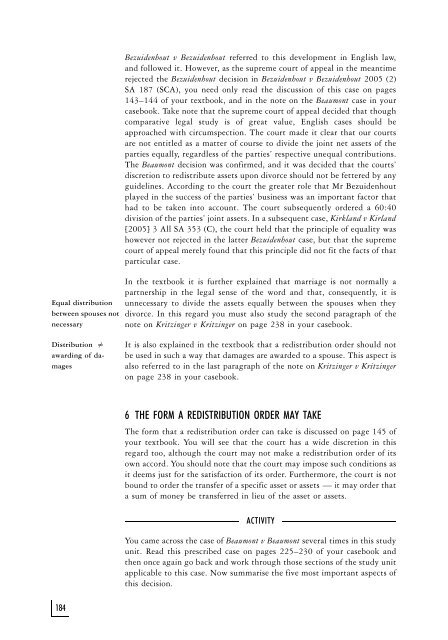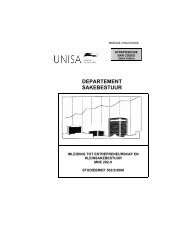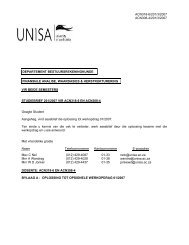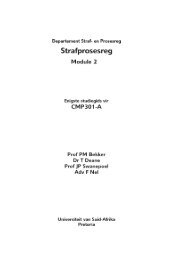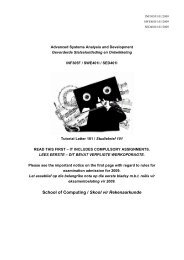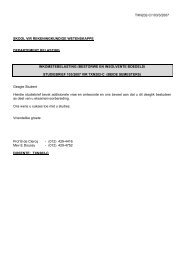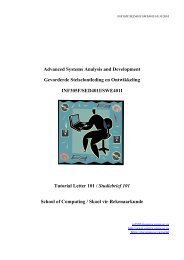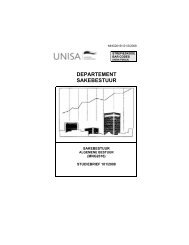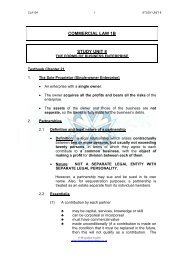key to the study guide - Name
key to the study guide - Name
key to the study guide - Name
Create successful ePaper yourself
Turn your PDF publications into a flip-book with our unique Google optimized e-Paper software.
Equal distribution<br />
between spouses not<br />
necessary<br />
Distribution =<br />
awarding of damages<br />
184<br />
Bezuidenhout v Bezuidenhout referred <strong>to</strong> this development in English law,<br />
and followed it. However, as <strong>the</strong> supreme court of appeal in <strong>the</strong> meantime<br />
rejected <strong>the</strong> Bezuidenhout decision in Bezuidenhout v Bezuidenhout 2005 (2)<br />
SA 187 (SCA), you need only read <strong>the</strong> discussion of this case on pages<br />
143±144 of your textbook, and in <strong>the</strong> note on <strong>the</strong> Beaumont case in your<br />
casebook. Take note that <strong>the</strong> supreme court of appeal decided that though<br />
comparative legal <strong>study</strong> is of great value, English cases should be<br />
approached with circumspection. The court made it clear that our courts<br />
are not entitled as a matter of course <strong>to</strong> divide <strong>the</strong> joint net assets of <strong>the</strong><br />
parties equally, regardless of <strong>the</strong> parties' respective unequal contributions.<br />
The Beaumont decision was confirmed, and it was decided that <strong>the</strong> courts'<br />
discretion <strong>to</strong> redistribute assets upon divorce should not be fettered by any<br />
<strong>guide</strong>lines. According <strong>to</strong> <strong>the</strong> court <strong>the</strong> greater role that Mr Bezuidenhout<br />
played in <strong>the</strong> success of <strong>the</strong> parties' business was an important fac<strong>to</strong>r that<br />
had <strong>to</strong> be taken in<strong>to</strong> account. The court subsequently ordered a 60:40<br />
division of <strong>the</strong> parties' joint assets. In a subsequent case, Kirkland v Kirland<br />
[2005] 3 All SA 353 (C), <strong>the</strong> court held that <strong>the</strong> principle of equality was<br />
however not rejected in <strong>the</strong> latter Bezuidenhout case, but that <strong>the</strong> supreme<br />
court of appeal merely found that this principle did not fit <strong>the</strong> facts of that<br />
particular case.<br />
In <strong>the</strong> textbook it is fur<strong>the</strong>r explained that marriage is not normally a<br />
partnership in <strong>the</strong> legal sense of <strong>the</strong> word and that, consequently, it is<br />
unnecessary <strong>to</strong> divide <strong>the</strong> assets equally between <strong>the</strong> spouses when <strong>the</strong>y<br />
divorce. In this regard you must also <strong>study</strong> <strong>the</strong> second paragraph of <strong>the</strong><br />
note on Kritzinger v Kritzinger on page 238 in your casebook.<br />
It is also explained in <strong>the</strong> textbook that a redistribution order should not<br />
be used in such a way that damages are awarded <strong>to</strong> a spouse. This aspect is<br />
also referred <strong>to</strong> in <strong>the</strong> last paragraph of <strong>the</strong> note on Kritzinger v Kritzinger<br />
on page 238 in your casebook.<br />
6 THE FORM A REDISTRIBUTION ORDER MAY TAKE<br />
The form that a redistribution order can take is discussed on page 145 of<br />
your textbook. You will see that <strong>the</strong> court has a wide discretion in this<br />
regard <strong>to</strong>o, although <strong>the</strong> court may not make a redistribution order of its<br />
own accord. You should note that <strong>the</strong> court may impose such conditions as<br />
it deems just for <strong>the</strong> satisfaction of its order. Fur<strong>the</strong>rmore, <strong>the</strong> court is not<br />
bound <strong>to</strong> order <strong>the</strong> transfer of a specific asset or assets Ð it may order that<br />
a sum of money be transferred in lieu of <strong>the</strong> asset or assets.<br />
ACTIVITY<br />
Youcameacross<strong>the</strong>caseofBeaumont v Beaumont several times in this <strong>study</strong><br />
unit. Read this prescribed case on pages 225±230 of your casebook and<br />
<strong>the</strong>n once again go back and work through those sections of <strong>the</strong> <strong>study</strong> unit<br />
applicable <strong>to</strong> this case. Now summarise <strong>the</strong> five most important aspects of<br />
this decision.


